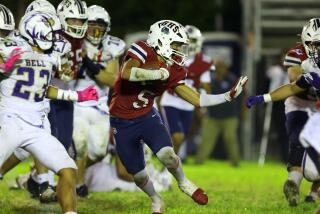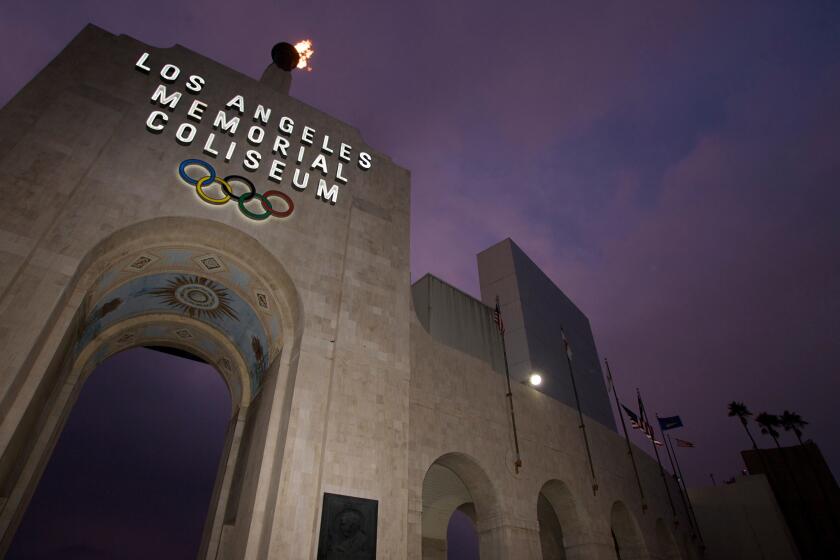Garfield’s band of brothers
Jim Birakos came to East Los Angeles from Greece just after World War II, an 8-year-old wearing what his next-door neighbor called lederhosen, so unfamiliar with America that he thought the Spanish he heard on the street was English.
Hiroshi Tanaka arrived at about the same time from the Tule Lake relocation camp, where his Japanese American family had been interned during the war. He was born in Manzanar, a second-generation American who could speak little English when his family moved to East L.A.
Hrair Shekerjian could speak the language but faced a different challenge when he moved west from Chicago a few years later. He was 12, with an unpronounceable name and a noticeable limp. At 5, he’d been crippled by polio.
And then there were the East L.A. natives, like Larry Weiss, who hailed from a Jewish family that had moved here from New York around the turn of the century, and Donald Lincoln Perez, born in Boyle Heights on Feb. 12, 1937, his middle name chosen by his parents to honor the president whose birthday he shared.
They were all neighbors back then in East Los Angeles; boys drawn from different corners of the world to the same streets, with the same interests, the same needs.
They loved sports, and they needed friends.
And they banded together with two dozen other boys from the neighborhood to create a brotherhood that, 60 years in, still feels like family to them.
*
In middle school, they were the Romans, their centurion logo lifted from a loaf of Roman Meal bread. They played basketball and baseball at Laguna (now Ruben Salazar) Park and built a clubhouse in Richard Regalado’s backyard, where they practiced their dance steps to Kennie Watanabe’s Frank Sinatra and Nat King Cole records.
When they got to Garfield High, the boys grew up. They called themselves a “car club” and changed their name to Nite Owls. Never mind that none of them had cars and all were in bed before midnight.
“We thought the name sounded cool,” remembered Weiss, now a retired teacher and principal. “We had really great jackets. Black with white leather sleeves, from Sears Roebuck.”
I imagine they were considered geeky by some standards. They held taco eating contests in the Regalados’ kitchen, went Christmas caroling at convalescent homes, held monthly dances — “to advance our social graces,” recalled Regalado — where they danced mostly with one another’s sisters and cousins.
They were young men aiming for the big time. They held weekly meetings, put out a mimeographed newsletter called The Nite Owl HOOT and planned trips to Yosemite and the Grand Canyon. They were varsity lettermen and student government leaders, and new members could join only by unanimous decision.
After graduating from Garfield, most of the 30 Nite Owls went on together to East Los Angeles Community College. Many went further, into careers as teachers, accountants, pharmacists and scientists. Over time, though, many of them fell out of touch.
Then, in 2002, Regalado invited all the guys to his wedding. His first wife, a Garfield High classmate, had died six years before; he wanted his buddies to meet his new bride. That launched a resurrection of Nite Owl pride, along with regular lunches, sporting events and the creation of annual scholarships for Garfield High grads.
I met Weiss, Shekerjian and Perez last spring when they presented three scholarships at Garfield’s awards night. Then last month, I joined them at a Silver Lake restaurant for what felt more like a family reunion than an alumni lunch.
I was intrigued not only by their longevity but also by the way their ethnic ties seem to blur against the backdrop of their camaraderie. It didn’t phase them that “the little Japanese fellow” Ray Urata was the taco-eating champ, that Donald Perez was named for the Great Emancipator, that Larry Weiss’ Jewish family had the area’s deepest roots.
They were a melting pot before the phrase was hijacked by the politics of identity.
*
They’ll say that what brought them together was athletics. “You might not speak the language well, you might look different, but you can still play sports,” said Tanaka, who grew up to become a teacher and varsity football coach at Marshall High.
But what kept them connected was much more.
“We found a chemistry that bonded us,” said Birakos, who went on to earn a doctorate in environmental science and spent 20 years as Southern California’s air quality czar. “We always supported one another.”
For Perez, that meant nobody mocked him when he made the C-team in basketball and became a “three-year man in ROTC. Some people would make fun, but my guys never did,” he said.
For sprinter Joe Robles, that meant a push when he needed it on the track. “Hrair was always clocking me,” he said. “I knew I had to run a certain time, and he was always urging me on. He was handicapped and I was able-bodied. That what I did meant so much to him was my encouragement.”
And for Shekerjian it meant a feeling of acceptance that never left. He was the stats man at Garfield’s football games for more than 30 years, until he had a stroke four years ago at 70, “because I wanted to give something back to a place that treated me so well.
“I had a lot of insecurity about not being able to mix in when I came here,” he said. “I always wanted to be normal, like everybody else. They made me feel very involved in everything, from all the sports activities to the parties, the dances, chasing girls.
“They accepted me as one of their friends, one of their brothers. And that is something you never lose.”
sandy.banks@latimes.com
More to Read
Sign up for Essential California
The most important California stories and recommendations in your inbox every morning.
You may occasionally receive promotional content from the Los Angeles Times.










